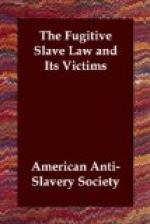The examination of witnesses was continued until Monday, February 4, when the commissioner listened to the arguments of counsel until February 7th. Messrs. Jolliffe and Gitchell appeared for the fugitives, and Colonel Chambers, of Cincinnati, and Mr. Finnell, of Covington, Kentucky, for the claimants of the slaves. A great number of assistants, (amounting very nearly to five hundred,) were employed by the United States Marshal, H.H. Robinson, from the first, making the expenses to the United States Government very large; for their twenty-eight days’ service alone, at $2.00 per day, amounting to over $22,000. February 8th, the case was closed, so far as related to the three slaves of Mr. Marshall, but the decision was postponed. The examination in regard to MARGARET and her children was farther continued. It was publicly stated that Commissioner Pendery had declared that he “would not send the woman back into slavery while a charge or indictment for murder lay against her.” Colonel Chambers, counsel for the slave-claimants, in his argument, “read long extracts from a pamphlet entitled, ’A Northern Presbyter’s Second Letter to Ministers of the Gospel of all Denominations, on Slavery, by Nathan Lord, of Dartmouth College,’ approving and recommending Dr. Lord’s views.” Colonel Chambers having alluded, in his remarks, to Mrs. Lucy Stone Blackwell, and said that she had sought to give a knife to Margaret Garner, the Court gave permission to Mrs. Blackwell to reply to Colonel C. Mrs. B. preferred not to speak at the bar, but addressed the crowded court-room directly after the adjournment. Her eloquent remarks will be found in the papers of the day. At the close of the hearing, February 14th, the commissioner adjourned his court to the 21st, afterwards to the 26th, when, he said, he would give his decision.
Meantime the case was making some progress in the State courts. Sheriff Brashears having made return to the Common Pleas Court that the fugitives were in the custody of the United States Marshal, Judge Carter said this could not be received as a true return, as they were in the County jail, under the sheriff’s control. The sheriff then amended his return, so as to state that the prisoners were in his custody, as required in the writ, and this was received by the Court. The fugitives now came fully into the charge of the State authorities. The sheriff held them “by virtue of a capias issued on an indictment by the grand jury for murder.”
The slaves declared
they would go dancing to the gallows
rather than to be sent
back into slavery.




